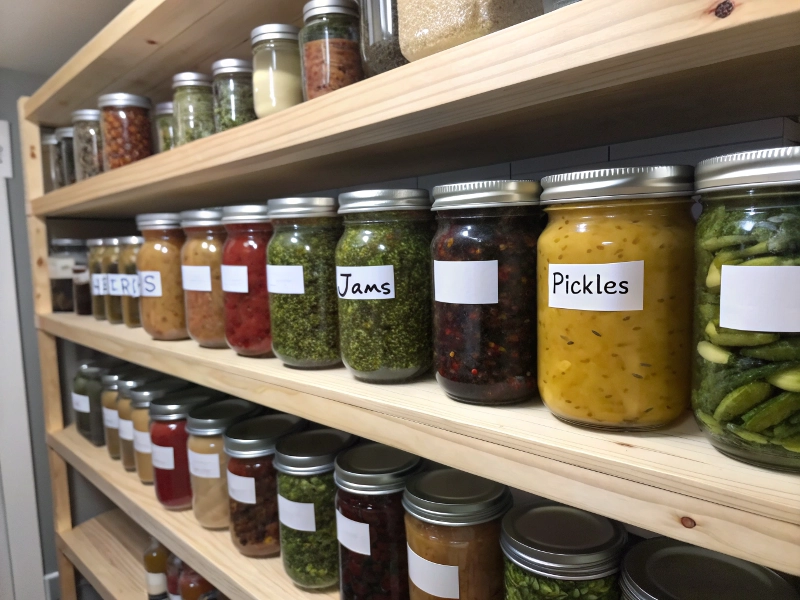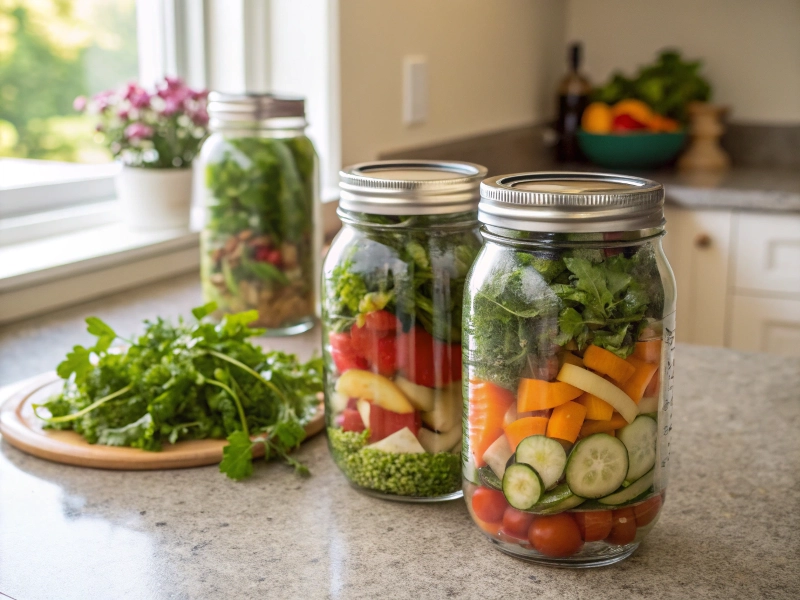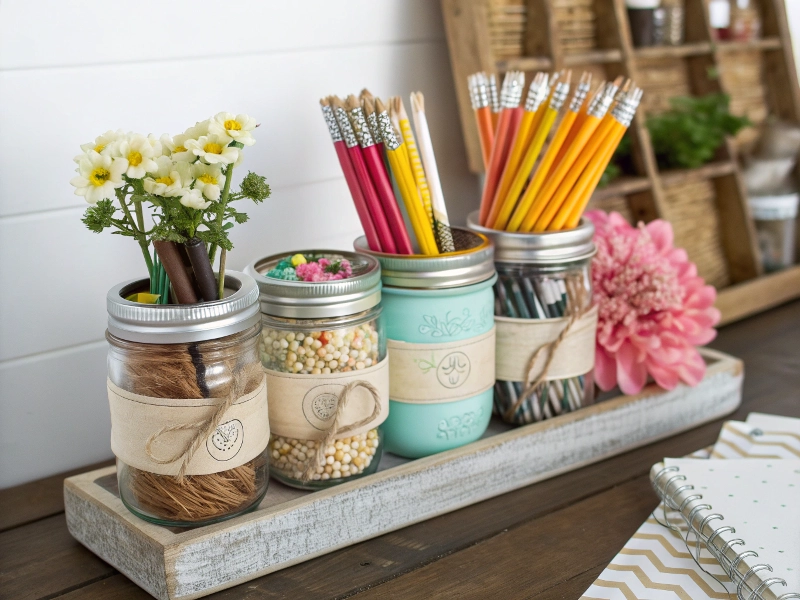Hey there, eco-conscious home cooks! Picture this: you’re staring into a cluttered fridge, wondering if those leftovers are still safe, or digging through a pantry full of plastic containers that just don’t feel right anymore. Sound familiar? I’ve been there, and it’s frustrating. So, how do you store food safely, keep your kitchen organized, and stay true to your green values? Mason jars are the answer. They’re safe, sustainable, and super versatile, making them the perfect choice for your kitchen. Let’s dive into why they’re a game-changer, starting with the big question: are they safe?
Here’s why Mason jars rock:
- They keep your food safe, whether it’s cooked leftovers or dry goods, with no scary risks like botulism.
- They’re eco-friendly, cutting down on plastic waste with reusable glass.
- They’re versatile and stylish, organizing your kitchen while looking good.
Ready to see how they do it? Let’s start with safety, because I know that’s top of mind when you’re storing last night’s chili.
Mason Jars Keep Your Food Safe, No Worries
You’re putting away dinner, and suddenly you wonder: are Mason jars safe for cooked food? I had the same question when I started using them. A few years back, I stored some homemade soup in a Mason jar, worried about botulism rumors. Spoiler: it was perfectly fine! Here’s why you can trust them.
Mason jars are safe for storing cooked food in the fridge for 4–10 days, with no botulism risk. They’re also great for dry goods, lasting years without issues. How do they pull this off? Let’s break it down.
- No botulism in the fridge. Botulism needs warm, airless conditions for months, but keeping jars below 40°F (4°C)—the standard fridge temperature, usually set to around 37°F (3°C)—stops it cold. My soup stayed fresh for a week, no problem.
- Glass beats plastic for cleanliness. Unlike Tupperware, Mason jars are non-porous, so bacteria don’t stick around. They also reduce cross-contamination—unlike plastic lids that can harbor odors, glass stays neutral, so your curry won’t taint your next smoothie.
- Plastic lids are a safety win. Metal lids can rust, but spill-proof plastic lids keep things secure. I use colorful ones from Amazon—search for ‘Mason jar plastic lids spill-proof’ to find ones like mine from brands like Aozita.
- Freezer-friendly, with a catch. You can freeze food in jars, but leave an inch of space to avoid cracks. I learned this after a frozen sauce jar split—oops!
- Dry goods stay pest-free. Vacuum sealing with oxygen absorbers keeps grains and beans safe for 1–3 years. I store rice this way, and it’s always bug-free.

So, are there any safety concerns with using Mason jars for cooked food? Nope, not if you store them in the fridge for 4–10 days. Refrigeration kills botulism risks, glass keeps bacteria at bay, and plastic lids avoid rust. Just check for false seals (when cooling creates a weak seal) and leave headspace in the freezer. Wash jars with hot, soapy water—no sterilization needed.
Plus, they’re a green dream. Let’s talk about how they save the planet while saving you money.
Mason Jars Are a Green Dream for Your Kitchen
I used to feel guilty tossing out cracked plastic containers, knowing they’d sit in a landfill forever. Switching to Mason jars was a lightbulb moment. Every time I use one, I feel like I’m doing my part for my kids’ future—no more worrying about oceans full of plastic. They’re the eco-friendly choice you’ve been looking for, cutting down on waste and keeping your kitchen green.
Mason jars reduce plastic waste with recyclable glass and reusable lids—and they’re affordable, too. They’re built to last, and their low-energy upkeep makes them a win for the planet. Here’s how they do it.
- Recyclable glass saves the earth. Unlike plastic, which can leach microplastics into your food over time, Mason jars are 100% recyclable, BPA-free, and keep your meals pure—perfect for eco-conscious cooks who care about health, too. When a jar eventually breaks, recycle it at your local glass facility—check RecycleNation.com for locations near you.
- Lids you can reuse for years. Plastic or metal lids last 1–3 years, and boiling resets metal gaskets for dry storage. I’ve reused mine for ages!
- No energy-hungry prep. Just wash jars with hot, soapy water—no boiling needed for cooked or dry food. Cleaning’s a breeze, with no stains or smells to worry about.
- Rodents can’t chew through. Glass keeps mice out, unlike plastic, so you don’t waste food or buy new containers.
- They save you money. A 12-pack of pint-sized Mason jars costs about $15, while fancy Tupperware sets run $40–$50. Reuse lids from other jars (like Parmesan shakers), and you’re golden.
| Feature | Mason Jars | Plastic Containers |
|---|---|---|
| Recyclable | Yes | Often not |
| BPA-Free | Yes | Varies |
| Reusable | 1–3+ years | Cracks over time |
| Rodent-Proof | Yes | No |

They’re not just green—they’re super practical and pretty, too. Let’s talk about how they make your kitchen shine.
Mason Jars Organize Your Kitchen with Style
Ever open your pantry and feel overwhelmed by a mess of containers? I did, until I started using Mason jars. They’re like the Marie Kondo of storage—versatile, organized, and oh-so-stylish. My kitchen went from chaos to Instagram-worthy, and yours can too.
Mason jars streamline your kitchen with multi-use storage and a sleek, transparent look. They work for everything from leftovers to grains, and their design keeps things tidy and chic. Here’s why they’re a must-have.
- Store anything, anywhere. From cooked salads (4–10 days in the fridge) to dry beans (3+ years), jars handle it all. Pick your jar size wisely—use 4-oz jars for spices, 16-oz for salads, and 32-oz for bulk grains like rice.
- See everything at a glance. Clear glass shows what’s inside, so no more forgotten leftovers. I label mine with chalkboard stickers for extra flair.
- Lids that pop with personality. Colorful plastic lids or reused ones (like from molasses jars) add style and function. My kids love the straw-hole lids for smoothies.
- Get creative with uses. I found that cooking in jars saves 40% on fuel by retaining heat better—fill a 16-oz jar with soup ingredients, seal it with a canning lid, and simmer in a pot of water for 30 minutes. Sprout seeds, or add fairy lights for decor. I made jar candles for a friend’s wedding—huge hit!
- Smart storage saves space. Stack jars in cardboard trays or fridge shelves. I use wood dividers in my pantry, and it’s a game-changer.

Frequently Asked Questions
Now that you know how affordable and easy Mason jars are, let’s tackle a question I get all the time—are they safe for cooked food?
Are there any safety concerns with using Mason jars to store cooked food?
You can store cooked food in Mason jars in the fridge for 4–10 days worry-free, thanks to refrigeration keeping bacteria at bay below 40°F (4°C). The non-porous glass cuts down on bacteria compared to plastic Tupperware, but you should check for false seals after cooling and use spill-proof plastic lids to avoid rust. If you’re freezing food, leave some headspace to prevent cracking. Just wash the jars with hot, soapy water—no need to sterilize.
So, there you have it—Mason jars are the ultimate solution for eco-conscious home cooks like us. They keep your cooked food safe in the fridge for 4–10 days without any botulism worries, store dry goods for years, and make your kitchen a safer place with their non-porous glass and trusty plastic lids. They’re a green dream, cutting down on plastic waste with recyclable glass and reusable lids that last for years—plus, they’re budget-friendly at just $15 for a 12-pack. And they’re so versatile and stylish, turning your pantry into an organized, Instagram-worthy space with their clear design and creative uses—like those jar candles I made for my friend’s wedding! My friend Sarah, a busy mom, switched to Mason jars for her kids’ snacks and hasn’t looked back—she loves how they keep everything fresh and safe. I started with just a few jars for leftovers, and now my whole kitchen’s a Mason jar haven. Grab a few Mason jars today—your planet-friendly kitchen starts now, and you’ll wonder why you didn’t switch sooner!
By Jane Doe, a food safety enthusiast and eco-conscious home cook, June 3, 2025.
Sources: USDA canning guidelines, Ball Mason Jar website, CDC botulism facts.
Affiliate links may be included for plastic lids on Amazon.




